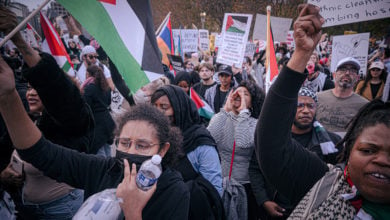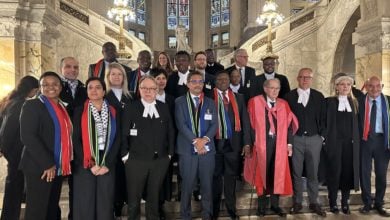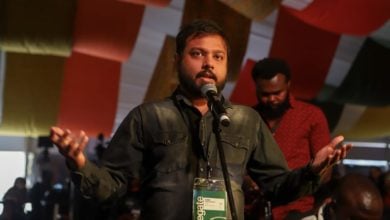We are sharing with our readers a three-part series published in soL, the weekly newspaper of the Communist Party, Turkey. The author, Selin Asker, is a soL news editor. At the beginning of March, as part of a Communist Party delegation, Selin travelled to Kobani to report on the destruction after the defeat of ISIL in Kobani as well as to conduct meetings with the Kurdish political leadership in Kobani. Liberation translation by Taylor Goel.
After having been swept 40 kilometers out of town, ISIL assaults on the surrounding villages continue, albeit at lower intensity. Kobani Deputy Prime Minister Khalid Berkel shares with us the information that the U.S.-led coalition air-strikes also played a role in the destruction of the town.
While security teams patrol the town, YPG forces continue the fight with ISIL in the villages. As the fighting continues, bodies of fallen guerrillas are brought to the town. Just in the period we were in Kobani, we received news of the deaths of two guerrillas.
KOBANI HOSPITAL
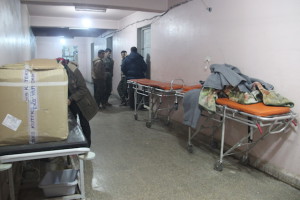
Resources for the treatment of the wounded are very scarce. The biggest hospital in Kobani was destroyed by a suicide attack. We learn that one of the floors of a school building still standing has been turned into a makeshift hospital. When we reach the so-called “hospital,” what we see is simply heartbreaking. Dozens of people lying down in a stuffy, damp, dark room. Dressing even a simple wound is a major challenge. Despite the extremely limited resources, there are medical personnel bustling around to help the wounded. An Algerian female doctor tells about about the needs of the infirmary and how badly they are in need of medicine.
We chat with YPG fighters who have recently been admitted to the hospital after they were wounded in the fighting in the villages. One has a first-degree burn, one says he doesn’t feel his feet after a hand-grenade exploded next to him. Every sentence concludes with the emphasis of how they are going to keep fighting until they finish ISIL off.
We meet a lot of people from Turkey who have come to Kobani to join the fight, one from Bursa (a city in north west Turkey) who had a 35-year jail sentence commuted, one from Nusaybin (a town in south east of Turkey close to the Syrian border) who says he wants to bring the rest of his family to Kobani, one from Diyarbakır (a city in south east Turkey), and one from Ağrı (a city in east Turkey close to the Armenian border) who tried to get up from his sickbed to see us off as we were leaving the hospital. Whether badly or lightly injured, they all firmly believe that they will achieve final victory.
On a separate note, there are only four operational pharmacies in town. “Operational” means “not totally destroyed.” The medicine stocks are very low.
AZADİ (FREEDOM) SQUARE
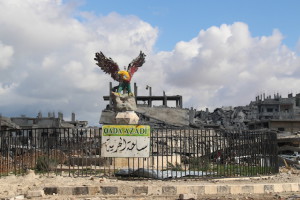
The biggest source of inspiration for the people fighting ISIL is Azadi Square. In the middle of the square, there is a giant statue of an eagle which has been riddled with bullets. For the people of Kobani, this statue serves as a monument for victory as it did not crumble despite all the bombardment and the fighting. Deputy Prime Minister Khalid Berkel says: “For three months, the fighting went on around the square, every morning when we woke up, we would check to see if the eagle was still standing. As the eagle kept standing, we would be filled with hope. This eagle has resisted with us.”
The area around the square is one of the worst hit as it formed the border between ISIL and YPG. Khalid Berkel also mentions that one of the reasons behind the utter destruction of the area is the air-strikes by the U.S.-led coalition.
A little further from the square, an ISIL tank is being displayed with YGP graffiti on it.
BAKİ XIDO CULTURAL CENTER
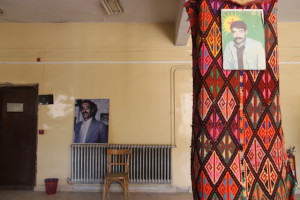
Despite everything, people are getting ready for Newroz [traditional new year celebration]. Preparations in the Cultural Center of the town are under way for the celebrations that will be held March 21st. We visit the cultural center named after one of the most popular dengbejs (Dengbej: A poet who recites in the form of songs), Baqi Xido. We are greeted with smiling faces by the artists and musicians of the center. They tells us that they are working with the children on the songs they will be singing during Newroz celebrations.
After tea and a little bit of chat, they show us the art pieces in the center. There are masterfully painted paintings of many people from Che to Sheik Said, from Baqi Xido to Mazlum Doğan. Other items that catch our eye are the photograph of Mohammad Shexo and various musical instruments including darabukkas and erbanes. But the most striking piece is a cartoon that depicts the flags of ISIL and Turkey on the two lenses of an eye-glass.
SURUÇ CAMP
On our way back, we stop at the camps in Suruç (a border town in Turkey close to Kobani). Suruç hosts the tent city that was built by the efforts of the local municipality to accommodate the thousands of refugees as the fighting in Kobani escalated.
The tents we visit are crowded with people, mostly women and children. They mention that they have not been able to leave their tents even in the hardest winter days. They say that it is not easy to stay or to go back. Their biggest desire is to be able to go back to the land they are yearning for. With patience, they are waiting for the days when Kobani will be a liveable town again.
The person in charge of the camp tell us that most of the aid has stopped after the news of the defeat of ISIL in Kobani. Most urgent needs are medicine, sanitary pads, diapers and baby food.
ISIL ATTACKS CONTINUE
It is clear that Kobani has been wounded deeply.The ISIL attacks that started the June of last year and that change in intensity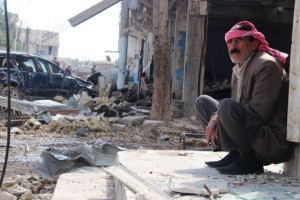 depending on other factors in the region have not yet ceased. All the motives for the initial ISIL attack on Kobani still exist.
depending on other factors in the region have not yet ceased. All the motives for the initial ISIL attack on Kobani still exist.
Unless the international mob that funded ISIL and later declared it to be “evil,” get their filthy hands off the region, a final victory for the people of the region does not seem very likely.
Photo Credit: Selin Asker/soL
Next:
Interview with Khaled Berkel, Deputy PM of Kobani Canton (Part 3)




